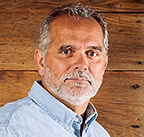By design, MDiv degrees develop competency in ministry skills. That’s a given.
But, at Ashland Theological Seminary, the process starts, continues — and concludes — with an emphasis on personal formation, as well.
![]() “We’ve designed the MDiv degree in such a way that, on the front end of students’ practical training, they spend a lot of time on issues of personal development, personal growth — personal formation,” explains Terry Wardle, D.Min., Professor of Practical Theology and Director, Institute of Formational Counseling at Ashland Theological Seminary in Ashland, OH. “Then, we begin to weave ministry formation into personal formation.”
“We’ve designed the MDiv degree in such a way that, on the front end of students’ practical training, they spend a lot of time on issues of personal development, personal growth — personal formation,” explains Terry Wardle, D.Min., Professor of Practical Theology and Director, Institute of Formational Counseling at Ashland Theological Seminary in Ashland, OH. “Then, we begin to weave ministry formation into personal formation.”
Read on to find out more about this personal formation focus, how Ashland is making the pursuit of an MDiv work with busy church leaders’ schedules, and more.

In what ways is an MDiv degree from your seminary unique?
Wardle: One of the required courses in our MDiv program is “The Person in Ministry,” which focuses on what Richard Foster calls the “upward and inward journey.” How will people who will be in ministry attend to their relationship with God, their intimacy with the Lord, their spiritual vitality, and their ongoing personal growth? We spend a lot of time on this, both curricularly and co-curricularly. Our experience has been that people don’t fail or lead in ministry because of competencies; the outcome depends more of their own spiritual vitality, the strength they have in Christ.
We’ve interwoven four primary core values — “the 4 Cs” — into the curricula: core identity, character, calling and competency. In every single course, we want to make sure our students are, in some ways, being impacted by all four.
In the past, we’ve found that students can get so focused on a competency (for example, how to administrate a church, or how to exudate scripture) that they begin to lose sight of how it integrates into the broader questions pertaining to being in ministry. So, we’re very intentional — even to the point of our syllabi — of designing courses that in some way are going to help students understand who they are in Christ (i.e., core identify); the importance of character; and then competency. I’ve found this to be an outstanding paradigm to keep all our courses mapped together in a significant way.
In what ways has the MDiv study format at Ashland evolved to suit church executives’ increasingly busy daily schedules?
Wardle: First, we’ve sought to decentralize our program so that it goes beyond our main campus here in Ashland to three satellite campuses in Cleveland, Detroit and Columbus.
Two other things have also become very important in this regard. One is offering courses in intensive modules so that a student can attend for a shorter period — maybe a weekend, or a five-day concentration — and pick up a course. Second, of course, they can also take courses online.
Let’s talkmore about how the MDiv curricula at Ashland has adapted to hone spiritual formation.
Wardle: Sure. At Ashland, we have developed a very integrated new program — Life 6:31 — that comes out of Mark 6:31: “Come away by yourselves to a secluded place and rest a little while.”
In this program, students come to our campus for something like a residency, similar to the new monastic movement. We provide them with free housing, and they are here for three years. We then work hard to integrate spiritual formation into ministry formation so they’re not only taking their courses, but they’re also involved in pre- and post-retreats every year. They’re in a weekly journey group. They have a spiritual director. Then, they go through a rotation of ministry incubators very similar to what someone would have done in the medical school — a different rotation and various specialties.
Life 6:31 kicks off in fall 2016, but we’ve already started to market it, with a tremendous response. Many people thought that the days of residency were over; but, we believe there are people out there who are very hungry for a deeper experience of Christ and community.
We’ve designed this program so that students take their classes as a cohort. They move through the whole curriculum as a group, building deep relationships and learning how to lean in to another — and, most definitely, coming to an understanding of the relationship between their own spirituality and their effectiveness in ministry.
Not just among MDiv students, but also among individuals who are going into church administration, I’m finding they’re really hungry for a deep spiritual vitality. There needs to be some guidance so that they’re not getting caught up in the barrenness of busyness. Or, to say it another way, so that they’re not sacrificing being in the interest of doing.
Are there other ways in which the MDiv curricula at Ashland have been specialized and honed to address emerging areas of need among senior and executive church leaders?
Wardle: One way is by having a cohort of students go through the practical ministry courses together. That happens in their second year of study.
At that time, we also bring in specialists in the business field. Over lunch, they provide lectures and dialog with students about topics such as personal health and well-being, how to deal with student debt, better understand the culture, and so on.
— Reporting by RaeAnn Slaybaugh


